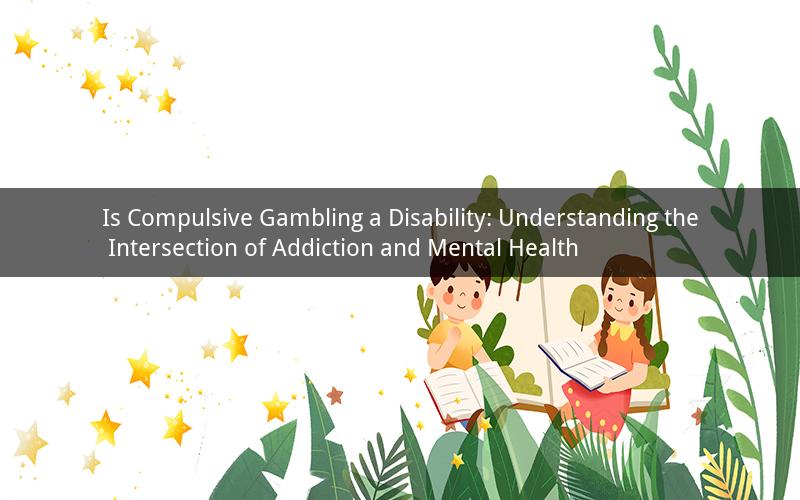
Compulsive gambling, often referred to as gambling disorder, has been a topic of considerable debate and research in recent years. As society becomes more aware of mental health issues, the question of whether compulsive gambling should be classified as a disability has gained prominence. This article delves into the complexities surrounding this issue, examining the criteria for a disability, the impact of compulsive gambling on individuals and society, and the ongoing discussions within the medical and legal communities.
Compulsive Gambling: A Brief Overview
Compulsive gambling is characterized by an inability to control the urge to gamble, despite negative consequences. Individuals with gambling disorder may experience a range of emotions, including excitement, anxiety, and desperation, as they engage in this behavior. Compulsive gambling can lead to financial, social, and emotional problems, and in some cases, it can even result in legal issues and self-harm.
The American Psychiatric Association (APA) first recognized gambling disorder as a mental health condition in the fourth edition of the Diagnostic and Statistical Manual of Mental Disorders (DSM-IV) in 1994. The APA has continued to refine the criteria for diagnosing gambling disorder in subsequent editions, with the current criteria outlined in the DSM-5.
Criteria for a Disability
To determine whether compulsive gambling qualifies as a disability, it is essential to understand the criteria set forth by the Americans with Disabilities Act (ADA). The ADA defines a disability as a physical or mental impairment that substantially limits one or more major life activities. Major life activities include, but are not limited to, caring for oneself, performing manual tasks, walking, seeing, hearing, speaking, breathing, learning, and working.
According to the DSM-5, individuals with gambling disorder may exhibit several symptoms, such as:
- Preoccupation with gambling
- Needing to gamble with increasing amounts of money to achieve the desired excitement
- Repeated unsuccessful efforts to control, cut back, or stop gambling
- Restlessness or irritability when attempting to stop gambling
- Returning to gambling after losing money to recoup losses
- Tolerance, or the need for increasing amounts of money to achieve the desired excitement
- Taking time from work or social activities to gamble
- Lying to conceal the extent of involvement with gambling
The Impact of Compulsive Gambling on Individuals and Society
Compulsive gambling can have severe consequences for individuals and society. Financially, individuals with gambling disorder may experience significant debt, loss of employment, and even bankruptcy. Socially, they may face strained relationships with family and friends, and they may isolate themselves due to the stigma associated with gambling disorder.
Societally, the cost of compulsive gambling is substantial. It can lead to increased crime rates, strained law enforcement resources, and reduced tax revenue. Moreover, the emotional and psychological toll on individuals with gambling disorder can be devastating, often resulting in depression, anxiety, and even suicidal thoughts.
The Ongoing Debate
Despite the clear evidence that compulsive gambling can be a disabling condition, the classification of gambling disorder as a disability remains a subject of debate. Some argue that gambling disorder is a legitimate mental health condition that deserves the same protections as other disabilities. Others contend that gambling disorder is not a disability because it is a voluntary behavior, and individuals have the choice to stop gambling if they so desire.
The medical community generally supports the classification of gambling disorder as a disability. The APA and the World Health Organization (WHO) both recognize gambling disorder as a mental health condition. However, the legal community is divided on this issue. Some courts have ruled that gambling disorder is a disability, while others have concluded that it is not.
Questions and Answers
1. What is the primary difference between gambling disorder and other addictive behaviors?
Gambling disorder is characterized by an inability to control the urge to gamble, despite negative consequences. This differs from other addictive behaviors, which may involve a physical dependence on a substance or behavior.
2. Can individuals with gambling disorder recover from their addiction?
Yes, individuals with gambling disorder can recover from their addiction with proper treatment and support. Treatment options may include therapy, medication, and support groups.
3. Is compulsive gambling a mental health condition?
Yes, compulsive gambling is recognized as a mental health condition by the APA and the WHO. It is classified as a gambling disorder in the DSM-5.
4. How can society help individuals with gambling disorder?
Society can help individuals with gambling disorder by raising awareness about the condition, providing access to treatment, and reducing the stigma associated with gambling disorder.
5. What is the most effective treatment for gambling disorder?
The most effective treatment for gambling disorder may vary from person to person. However, evidence-based treatments, such as cognitive-behavioral therapy (CBT) and support groups, have been shown to be effective in helping individuals with gambling disorder manage their addiction.
In conclusion, the question of whether compulsive gambling is a disability is complex and multifaceted. While the medical community generally supports the classification of gambling disorder as a disability, the legal community remains divided on this issue. As society becomes more aware of mental health issues, it is crucial to continue the discussion and work towards a better understanding of compulsive gambling and its impact on individuals and society.